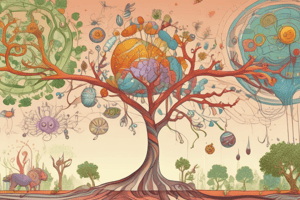Podcast
Questions and Answers
What is the central dogma of molecular biology?
What is the central dogma of molecular biology?
- Genetic information flows from RNA to protein to DNA
- Genetic information flows from protein to RNA to DNA
- Genetic information flows from DNA to RNA to protein (correct)
- Genetic information flows from protein to DNA to RNA
Which category of metabolism involves the synthesis of complex molecules from simpler ones using energy?
Which category of metabolism involves the synthesis of complex molecules from simpler ones using energy?
- Metabolism
- Catabolism
- Anabolism (correct)
- Dehydration synthesis
What is the focus of biochemistry?
What is the focus of biochemistry?
- Study of chemical reactions within cells and macromolecules (correct)
- Study of weather patterns
- Study of ancient civilizations
- Study of planets and stars
Which process is essential for the growth, development, and functioning of all living organisms?
Which process is essential for the growth, development, and functioning of all living organisms?
What is evolution?
What is evolution?
Which subdiscipline does biochemistry fall under?
Which subdiscipline does biochemistry fall under?
What is evolution?
What is evolution?
Which of the following factors can contribute to evolutionary change?
Which of the following factors can contribute to evolutionary change?
What does genetic drift refer to in the context of evolution?
What does genetic drift refer to in the context of evolution?
How can new genetic variation arise in organisms?
How can new genetic variation arise in organisms?
What does a phylogenetic tree represent?
What does a phylogenetic tree represent?
Which process involves the movement of genetic material between populations?
Which process involves the movement of genetic material between populations?
Study Notes
Biology: Evolution and Biochemistry
Biology is a scientific discipline that focuses on the study of living organisms and their interactions with their environment. It is a vast field that encompasses numerous subdisciplines, including evolution and biochemistry. This article will provide an overview of the topics of evolution and biochemistry within the context of biology.
Evolution
Evolution is the process of gradual change in a population of organisms over time. This change can lead to new species arising from older species. The evolutionary relationships among organisms can be represented by a diagram called a phylogenetic tree, which shows the ancestry and branching of different species from a common ancestor.
Evolution is driven by several factors, including genetic drift, mutation, gene flow, and natural selection. Genetic drift refers to the random change in the frequency of alleles (alternative forms of a gene) in a population over time. Mutation is the process by which new genetic variation arises, often through de novo point mutations in the DNA sequence of an individual organism. Gene flow, or the movement of genetic material between populations, can also contribute to evolutionary change. Finally, natural selection, the process by which certain traits become more or less common in a population based on their impact on survival and reproduction, is a major driving force behind evolution.
Biochemistry
Biochemistry is the study of the chemical processes and substances that occur within living organisms. It involves the study of the structure and function of macromolecules, such as proteins, nucleic acids, and carbohydrates, as well as the chemical reactions that occur within cells.
One of the fundamental principles of biochemistry is the central dogma of molecular biology, which states that genetic information flows from DNA to RNA to protein. This means that DNA, the genetic material, provides the blueprint for the production of RNA, which in turn instructs the synthesis of proteins, the functional molecules of the cell. This process is essential for the growth, development, and functioning of all living organisms.
Biochemistry also involves the study of metabolism, the set of chemical reactions that occur within organisms to maintain life. Metabolism can be divided into two main categories: catabolism, which involves the breakdown of complex molecules into simpler ones to release energy, and anabolism, which involves the synthesis of complex molecules from simpler ones using energy.
In conclusion, biology is a diverse and complex field that encompasses numerous subdisciplines, including evolution and biochemistry. Evolution is the process of gradual change in a population of organisms over time, driven by factors such as genetic drift, mutation, gene flow, and natural selection. Biochemistry is the study of the chemical processes and substances that occur within living organisms, focusing on the structure and function of macromolecules and the chemical reactions that take place within cells.
Studying That Suits You
Use AI to generate personalized quizzes and flashcards to suit your learning preferences.
Description
Learn about evolution, the process of gradual change in organisms, driven by genetic drift, mutation, gene flow, and natural selection. Explore biochemistry, the study of chemical processes in living organisms, focusing on macromolecules, metabolism, and the central dogma of molecular biology.




